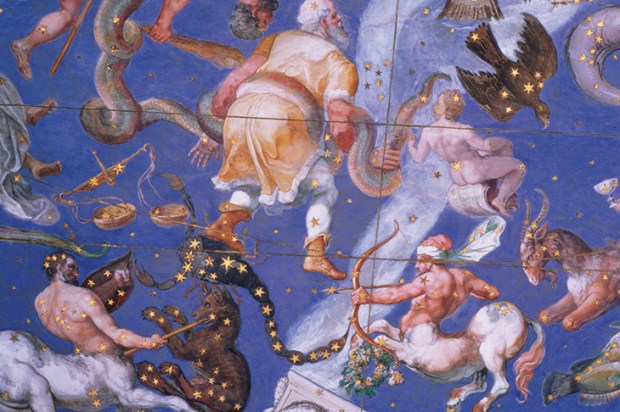The title of Victor Pelevin’s 2011 novel stands for ‘Special Newsreel/Universal Feature Film’. This product is made by the narrator, who pilots his hi-tech camera without leaving his room, propped up against cushions. The corpulent Damilola Karpov lives in Byzantion, or Big Byz, an ‘offglobe’ hovering over what’s left of the old world after the collapse of its superpowers and other apocalyptic events. Down below is a country called Urkaine (the apparent misspelling is a pun on a slang Russian word for ‘criminal’), populated by drunks and ruled by gangsters, its symbol a golden ‘spastika’, its economic goal ‘to catch up with and overtake Big Byz in terms of major stock indices’. Every now and again, Big Byz provokes a war in Urkaine, using professionals like Damilola, who cross warfare with video techniques to make news clips — aka snuff films — of events they orchestrate themselves.
Urkaine reacts to Big Byz and its interventions with a ‘meticulously balanced blend of servile submission and rabid hatred’. There is a lot to hate about this PC-obsessed utopia where the age of consent has been raised to 46 and 3D simulations have almost completely replaced life. Damilola, a typical creative, has taken out a hefty mortgage to buy a ‘sura’, or surrogate wife, a human-like doll whose settings he often plays with, increasing the level of ‘bitchiness’ or ‘spirituality’ to his satisfaction. The world according to Pelevin may have gone mindless but not godless: everyone worships Manitou, as well as manitou, the latter meaning both ‘monitor’ and ‘money’.
Pelevin’s hallmark puns, dating back to his days as a copywriter, abound in the book: Damilola’s company is called DK V-Arts & All; a media outlet he works for has as its slogan ‘The CINEWS of thy heart’. Humour becomes more biting when turned on liberal values: a rubber woman displayed by a dictator with a penchant for boys is a ‘declaration of tolerance and willingness for intercultural dialogue’. Intellectuals get their share of mocking too: Damilola’s sidekick calls himself a philosopher, but his official job title is ‘crack discoursemonger first grade’. The unending wordplay generates such terms as ‘shiterary philolophile’, handled by the translator Andrew Bromfield with his usual confidence.
Known for his interest in Buddhism, Pelevin reiterates the concept of emptiness, implying that both the civilised West and its barbaric counterpart exist solely in the mind. By contrast, some commentators have hailed S.N.U.F.F. as a prescient warning of Russia’s recent acts of aggression towards Ukraine. Despite its contemporary flavour and futurist technologies, the novel is similar in its message to Homo Zapiens, Pelevin’s satirical portrait of 1990s Russia: the idea of life as a product of the media is central to both. ‘A human being,’ the narrator claims, ‘is simply an instrument for the application of culture to reality’, and fictional Urkaine looks only slightly less plausible than its prototype.
Got something to add? Join the discussion and comment below.
Get 10 issues for just $10
Subscribe to The Spectator Australia today for the next 10 magazine issues, plus full online access, for just $10.
Available from the Spectator Bookshop, £21 Tel: 08430 600033
You might disagree with half of it, but you’ll enjoy reading all of it. Try your first month for free, then just $2 a week for the remainder of your first year.














Comments
Don't miss out
Join the conversation with other Spectator Australia readers. Subscribe to leave a comment.
SUBSCRIBEAlready a subscriber? Log in